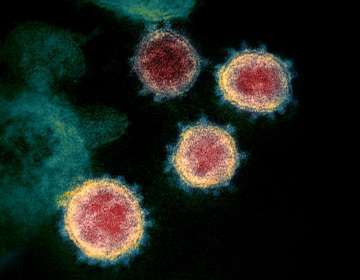Lancet study finds no significant clinical benefits of antiviral drug remdesivir
Treatment with antiviral drug remdesivir may not significantly speed up recovery from COVID-19 in critically ill hospitalised patients compared to placebo, according to the first randomised trial of its kind published in The Lancet journal.

Treatment with antiviral drug remdesivir may not significantly speed up recovery from COVID-19 in critically ill hospitalised patients compared to placebo, according to the first randomised trial of its kind published in The Lancet journal. The study led by researchers from China-Japan Friendship Hospital and Capital Medical University in China involved 237 adults aged 18 and older from ten hospitals in Wuhan.
Although the study is the first randomised controlled trial -- considered the gold standard for evaluating the effectiveness of interventions -- of remdesivir, the researchers cautioned that interpretation of their findings is limited because the study was stopped early after they were unable to recruit enough patients due to the steep decline in cases in China.
They conclude that more evidence from ongoing clinical trials is needed to better understand whether remdesivir can provide meaningful clinical benefit. The researchers noted that in the absence of any known treatment for COVID-19, remdesivir is one of a handful of experimental drugs undergoing clinical trials worldwide. It has only been available to patients with COVID-19 on compassionate grounds -- the use of unapproved drugs when no other treatment is available, they said.
In the trial, all patients received standard care including lopinavir–ritonavir, interferons, and corticosteroids.
"Unfortunately, our trial found that while safe and adequately tolerated, remdesivir did not provide significant benefits over placebo," said Professor Bin Cao from China-Japan Friendship Hospital and Capital Medical University. Remdesivir was originally developed to treat Ebola, and is designed to interfere with the way a virus reproduces, thereby stopping it from multiplying inside the body, the researchers said.
It has been shown to successfully block SARS-CoV-2 from replicating in vitro, and had activity against other coronavirus infections like severe acute respiratory syndrome (SARS), Middle East respiratory syndrome (MERS), and COVID-19 in animal studies, they said. "This is not the outcome we hoped for, but we are mindful that we were only able to enrol 237 of the target 453 patients because the COVID-19 outbreak was brought under control in Wuhan," Cao said.
"What is more, restrictions on bed availability resulted in most patients being enrolled later in the disease course, so we were unable to adequately assess whether earlier treatment with remdesivir might have provided clinical benefit," Cao explained. The researchers noted that future studies need to determine whether earlier treatment with remdesivir, higher doses, or combination with other antivirals or SARS-CoV-2 neutralising antibodies, might be more effective in those with severe illness.
The team noted that case studies have reported benefit in some severely ill patients with COVID-19, but until now, there have been no clinical trials of remdesivir, so its efficacy against COVID-19 in patients is unknown. In this study, 237 adults hospitalised with severe laboratory-confirmed SARS-CoV-2 infection were enrolled between February 6 and March 12, 2020.
Participants were randomly assigned to either daily infusions of remdesivir -- 158 patients were given 200mg on day 1 followed by 100mg on days 2–10 -- or placebo infusions, given to 79 patients for 10 days. The researchers measured time to clinical improvement over 28 days using a six-point scale of clinical status ranging from hospital discharge to death.
No statistically significant difference in time to clinical improvement was noted between the groups -- average time to clinical improvement 21 days for remdesivir group vs 23 days placebo group, according to the researchers. In a secondary outcome, although not statistically significant, in patients treated within 10 days of illness onset, those receiving remdesivir appeared to recover faster than those given placebo, with an average time to clinical improvement 18 days against 23 days, they said. Death within 28 days of randomisation was similar between the groups, with 14 per cent patients dying in the remdesivir group compared with 13 per cent in the placebo group, the researchers said.
However, they found that in secondary outcomes, patients treated with remdesivir within 10 days of illness onset had a lower, but not statistically significant, difference in mortality, with 11 per cent patients dying compared with 15 per cent receiving placebo. Treatment with remdesivir did not result in significant reductions in viral load -- how much SARS-CoV-2 is present in an infected person’s body -- or detection of the virus in the upper or lower respiratory tract compared with placebo, the researchers found.
There was no difference in adverse events between the groups, and the overall proportion of serious adverse events was lower in patients given remdesivir than placebo, they said.
However, more patients in the remdesivir group discontinued treatment because of adverse events including gastrointestinal symptoms like nausea and vomiting, and cardiopulmonary failure, according to the researchers. Participants in the trial were less ill, and treated earlier in their disease course, compared with a recent observational study of patients with COVID-19, who received remdesivir on compassionate grounds, they said. "Yet, remdesivir did not provide greater benefits in our study population as expected," said Professor Ronghui Du from Wuhan Lung Hospital, China.